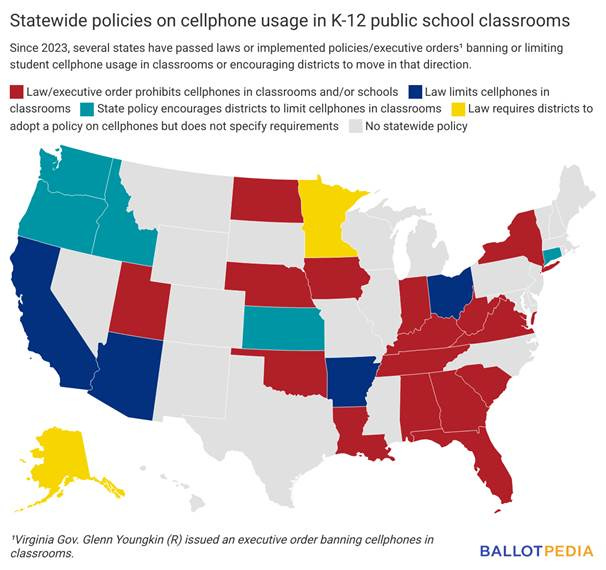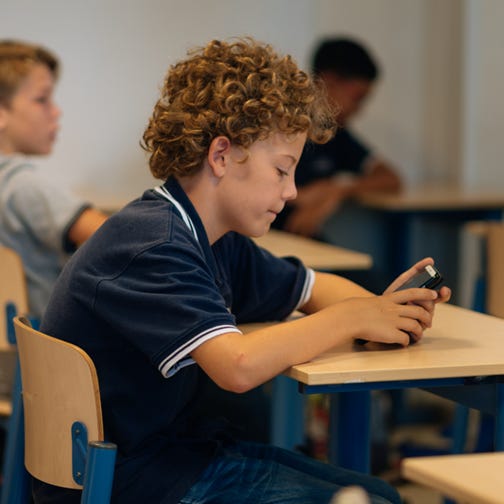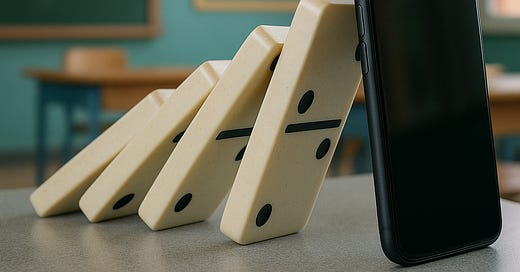Hey everyone, happy Monday! Some quick housekeeping - I’ve been working on a new piece with Dr. , which I’m thrilled to say will be coming out next week. To coordinate our posting schedules (and to avoid blowing up your inboxes), that post will come in next Tuesday, June 24. As a result, there will be no post Monday, June 23.
Alrighty, with that out of the way, on we go.
Most issues in public policy live in the gray. Over ten years working in politics has taught me that stamping your feet and shouting louder than the other guy rarely leads to lasting solutions. In my experience, policy wins come from listening, adapting, and acknowledging that most issues are messier than they appear on the surface.
But on phones in schools? Nah. Get them out of the classroom, full stop.
I’ve written about this before. Each time, I’ve made the same argument. Not because I hate technology. Not because I think kids should grow up in a digital vacuum. But because we’ve created a learning environment where the single biggest barrier to attention, focus, and real-world connection ever created is sitting right there in every student’s pocket.
Now, finally, we’re seeing real movement - state after state is stepping in to limit or ban phones during the school day. And that’s a very good thing.
The Legislative Wave
My home state of Texas just passed a bill requiring public schools to prohibit student cellphone use during the school day. It gives districts the flexibility to decide how to enforce the rule - whether through outright bans, locked pouches, central storage, or other methods - while also requiring clear disciplinary consequences. It’s a smart, balanced approach that sets firm boundaries without micromanaging local schools. Score one for the Lone Star State.
Now, I could spend all day cheering my home and explaining why this just adds to the list of reasons that Texas is objectively better than the other states; but, I’m going to restrain myself. Because this isn’t just a Texas thing. It’s bigger than that.

With Texas now in the fold, twenty-two states have now passed laws or statewide policies that prohibit or significantly limit the use of cellphones during the school day. That includes the most populous states represented by both major parties: California and New York Democrats on one side, Florida and now Texas Republicans on the other. You know a policy has legs when it has California progressives and Texas conservatives nodding along in agreement.
This approach isn’t ideological, it’s practical. And the bipartisan support we’re seeing nationwide confirms it.
Not Just a Trend, a Course Correction
For over a decade, we let smartphones infiltrate every part of childhood - including classrooms. At first, it was seen as innovative. Then it became convenient. Eventually, it was just normal.
And the results? They’ve been a disaster.
Academic performance is down. Attention spans are fractured. Mental health is deteriorating. Ask any teacher what the number one challenge is in the classroom today, and you’ll hear the same answer: phones.

We spent years hoping kids would self-regulate. That digital tools would enhance learning. That boundaries could be maintained without enforcement.
That experiment failed. This new wave of legislation isn’t another moral panic; it’s a much-needed course correction.
The Pushback - and Why It’s Losing Ground
Of course, not everyone’s on board. One of the most common concerns - and one I genuinely sympathize with - is safety. In a world where school shootings and lockdown drills are a real part of school life, it makes sense that parents want their kids to have a direct line of communication in an emergency. I’m a parent, and in all honesty, I get it.
But we also need to be honest about what phones actually do in those situations. The mass majority of schools now have rapid emergency response systems in place, classrooms have been hardened, and teachers are trained to react to the chaos of a shooting. In practice, phones can add to that chaos by spreading rumors, jamming up lines, even live-streaming traumatic events. Worse, they can contribute to what happens before the emergency: cyberbullying, harassment, and viral humiliation - all of which can help create the conditions for school violence in the first place.
Then there’s the argument that we should teach kids to be responsible with their devices. In theory, sure. In reality, we’re handing them devices designed by some of the smartest people on the planet specifically to hijack attention and hoping their under-construction adolescent brains can resist. That’s not teaching responsibility, it’s setting them up to fail.
We absolutely should teach responsible tech use. But that starts with boundaries that support good habits, not with handing over full access and crossing our fingers during pre-algebra.

The Dominos Are Falling
When the most populous states in both parties - California, Florida, New York, and Texas - all take action on something, the rest of the country pays attention. This is no longer an isolated reform. It’s a national movement. The domino effect has already begun.
But the job’s not done yet.
Plenty of states are still stuck in the debate stage. Some have no policies on phones in schools at all. And even in places that have passed laws, implementation will matter. Parents, teachers, and administrators have to keep pushing forward - clearly, firmly, and with local flexibility - until we finish the job.
Phones don’t belong in classrooms. Not because we fear technology, but because we care about focus, learning, and the well-being of our kids.
This moment gives us a rare chance to reset. Let’s not waste it.
Let’s finish what’s been started. Let’s give students their classrooms - and their attention spans - back.






I’m glad to see this trend as it’s been a long time coming. I am seeing another trend, where students pushed back and found loopholes and implementation will vary per school. I Was speaking to another parent in VA last week and they mentioned that their school board just allowed phone use during lunch break based on the motion proposed by students, which they believe is still within the interpretation of bell to bell.
I am very sympathetic to all the arguments here, and support phone bans. But it's worth noting that the evidence for positive effects from phone bans is surprisingly weak. I wrote about it a couple months ago (https://open.substack.com/pub/topkomment/p/should-schools-ban-phones). There's overwhelming evidence that screens themselves are damaging, but it does seem like unregulated usage outside of schools tends to be enough to trigger the bad effects.
Again, I support the bans anyway, since I have a pretty strong prior that bans have to be useful, and because it's a hard topic to study. And there have been SOME studies with positive results. But I'm also nervous about motivated reasoning driving policy, so I try to keep an open mind.